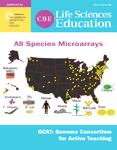Teaching Human Genetics with Mustard: Rapid Cycling Brassica rapa (Fast Plants Type) as a Model for Human Genetics in the Classroom Laboratory
Abstract
We have developed experiments and materials to model human genetics using rapid cycling Brassica rapa, also known as Fast Plants. Because of their self-incompatibility for pollination and the genetic diversity within strains, B. rapa can serve as a relevant model for human genetics in teaching laboratory experiments. The experiment presented here is a paternity exclusion project in which a child is born with a known mother but two possible alleged fathers. Students use DNA markers (microsatellites) to perform paternity exclusion on these subjects. Realistic DNA marker analysis can be challenging to implement within the limitations of an instructional lab, but we have optimized the experimental methods to work in a teaching lab environment and to maximize the “hands-on” experience for the students. The genetic individuality of each B. rapa plant, revealed by analysis of polymorphic microsatellite markers, means that each time students perform this project, they obtain unique results that foster independent thinking in the process of data interpretation.



